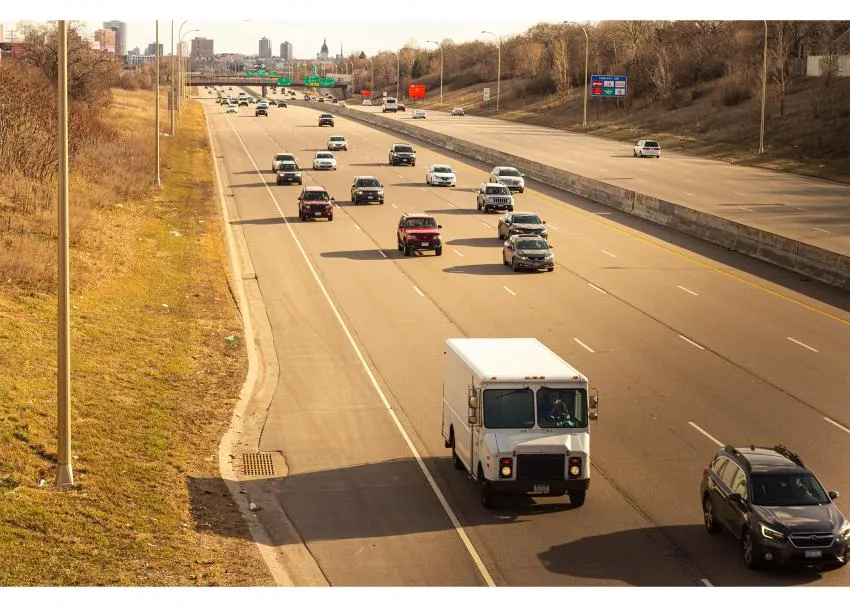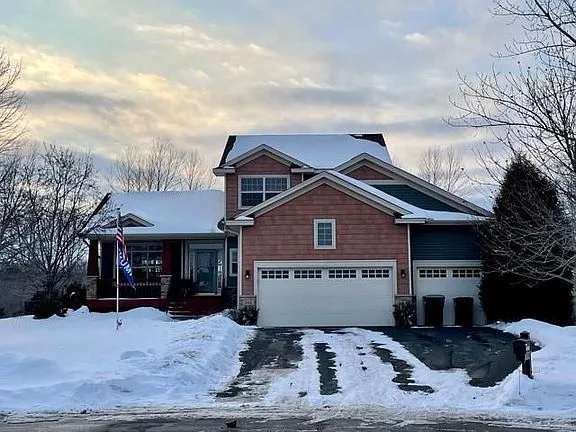Telecommuting And The Rise Of The Digital Nomad

The one word most closely associated with American's relationship with motor vehicles: Dependency. The post-WWII golden age of America saw suburbs beginning to not only grow but explode.
The American Dream was in the form of sprawling suburbs stretching as far as the eye can see. Each family only needs one parent earning income to financially sustain their little box on the hillside.
This parent (usually the father) would commute from the suburbs into the city to make their living. However, dreams don't last long.
Dwight D. Eisenhower signed The Federal Highway Act in 1956. 41,000 miles of road were to be built from coast to coast, helping Americans drive to and from work seamlessly.
As roads help Americans commute to work, the continuing stretches of suburban development made destinations farther and the neighborhoods more crowded.
With everything just out of reach by foot with no accessible public transportation, it was getting harder to find a house in America without access to a motor vehicle.
2020 forced us to look at things differently, though.
COVID-19 changed innumerable aspects of every person's life and has raised questions about our future. One of the main questions raised:
How will the modern commute look?
With the pandemic spreading from person to person contact, individuals and businesses alike had to make snap decisions. Much, if not all, work that has to be in person but "non-essential" like food service were promptly shut down; furloughing its employees.
Other forms of work found that they could adapt rather than cease operations.
An early study from the National Bureau of Economic Research showed that, out of 50,000 people surveyed, over 1/3 switched from commuting to working from home while another 10% were laid-off or furloughed at the start of the pandemic.
The same study concluded that 37% of all jobs could be done from home permanently. With well over 1/3 of the population potentially switching to full or even part-time remote work, the changes in our society would be drastic; and for the good.
Traffic congestion would almost disappear

With nearly all households owning or having access to a car, it's safe to say most Americans drive or ride in a car at least a few days a week.
More the 300 million Americans are on the move in individual motor vehicles, waiting long periods of time in traffic and excreting ungodly amounts of Co2 into the atmosphere. Although, this would look a whole lot different if 1/3 of the population worked from home either full-time or even part-time.
Youtuber Road Guy Rob covers the topic in the video below:
Along with overall traffic congestion dispersing, roadways for "essential" transport, like construction workers or first responders, or public transportation would prove to be consistent thus saving critical time in some cases.
You can have a big city job without the cost
Large-market cities are cultural and economic powerhouses of a state or even an entire region. With these cities' size and influences, there comes a steep cost.
If you get the job you're looking for you could afford to live in the city, but barely. You may decide to move out to the suburbs for a cheaper cost, but then you'll have to commute.
This where remote work can balance that out. Take this for example.
Let's say I secure a job in Minneapolis that pays decent, say $45,000 a year. With a consistent job and pay, I decide to buy a house. If I had to physically go to work every day, but didn't want to commute too far, I would have to find a house within the city.
Here is a house that is currently for sale in Minneapolis:

- 4 bedrooms
- 2 baths
- 1,568 square feet
- Price: $358,000
Now, here's a house for sale in Isanti, MN which is less populated and over an hour away from the metro area:

- 5 bedrooms
- 4 baths
- 3,161 square feet
- Price: $359,000
One extra bedroom, two extra bathrooms, and over double space for almost the same price.
You earn that big city wage without spending an egregious amount of that wage to afford a comfortable home, thus giving you more purchasing power with every dollar.
Businesses save money on office space

With all or most employees working from home, businesses wouldn't require large, expensive, and centrally located office spaces.
Alternatively, if you need to leave home for work but still work in an office setting, businesses can easily afford a stipend to rent out smaller office spaces. These smaller office spaces may be only a few minutes away from your home instead of almost an hour both ways.
These big office spaces that may be abandoned down the road can be repurposed to fill new needs such as affordable housing or event space.
You can save time and money with a vastly shorter commute, and so will businesses.
Earn Anywhere
Wanderlust afflicts many of us. We're curious to see what's beyond the horizon and find new landscapes and people. The problem with that; it takes time to travel.
The average American workweek is 40+ hours. If you wanted to travel across the country and really see the country, you have to take a significant amount of time off work.
If you can work remotely, you wouldn't need to take all that time off to travel. All you would need is a reliable internet source.
Sure, you would have to commit time during the week to work, but you don't have to go all the way home to do so.
Plus, your "new cubicle space" could look like this:

More flexibility=more family time
Whether you have children, furry friends, both or neither, remote work would give hundreds of thousands of families more time together.
The general stigma of American adults having to sacrifice a fulfilling, stable career in favor of having a healthy family dynamic or vice versa will be turned on its head.
Now individuals can continue to build upon their career without having to put family off to the side. Your lunch break can consist of walking a few feet to your kitchen and having a "business lunch with your children or taking your dog for an afternoon walk.

Additionally, families could save almost $1,000 per child a month not having to enroll them in daycare.
Remote work could cause households to feel crowded, but if families can make it work, it would prove beneficial to have loved ones around more.
Is Telecommuting really the future?
It's hard to say at the moment, but the trial year of 2020 produced promising results.
It won't be an overnight change, it would take our society at least a few years to acclimate. Furthermore, the way we think about and build infrastructure would drastically change.
Highways, residential areas, and public transportation would have to evolve to better accommodate its inhabitants; businesses would change the way they conduct their business, and so on.
There are many factors and variables subject to change during this transition, even some we don't know about yet. If this transition is successful, though, the world could see cleaner skies, empty roads, and families whose hearts are full.
Opinions and Perspectives
I've been working remotely for 2 years now and honestly can't imagine going back to a daily commute. The time and money saved is incredible.
While I appreciate the flexibility of remote work, I really miss the social aspects of being in an office. Video calls just aren't the same as impromptu coffee chats.
The point about housing costs is so true. I kept my San Francisco salary but moved to Colorado. My mortgage payment is less than half of what my rent used to be.
Am I the only one worried about career growth opportunities when working remotely? It feels harder to network and get noticed by leadership.
The environmental impact is huge. Just think about all those cars not sitting in traffic anymore pumping out emissions.
My company tried hybrid work but it was a mess. Half empty offices and scheduling nightmares. We either need to be all in or all remote.
I agree with the previous comment about hybrid challenges. The middle ground sounds good in theory but creates more problems than it solves.
Let's be real, remote work is fantastic for parents. I can actually attend my kids' school events now without using vacation days.
Not everyone has the luxury of remote work though. We need to remember service workers, healthcare, construction etc still need to show up in person.
The digital nomad lifestyle sounds glamorous but trying to work from cafes and deal with spotty wifi is more stressful than people realize.
Remote work should be about having freedom to choose your environment, not being forced to stay home. My company gives us a stipend for coworking spaces.
Interesting article but I think it underestimates how many jobs still require face-to-face interaction to be effective.
My mental health has improved so much since going remote. No more anxiety from rush hour traffic or office politics.
The housing price comparison in the article really opened my eyes. Why pay premium city prices if you can work from anywhere?
I actually moved back in with my parents temporarily since I can work remotely now. Saving tons of money for a down payment.
Working parents have it easier now but what about young professionals trying to learn from mentors? Some things are better in person.
The future is definitely hybrid. Companies that force everyone back to the office full time will lose talent.
My team is more productive than ever working remotely. No more unnecessary meetings or workplace distractions.
Remote work sounds great until your internet goes down during an important presentation. Infrastructure needs to catch up.
The suburban sprawl mentioned in the article might actually get worse if everyone moves further from cities.
I love that the article mentions repurposing office buildings. We could solve housing shortages in major cities.



